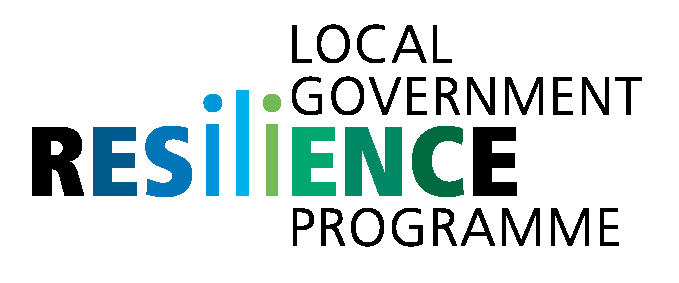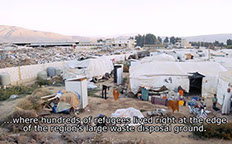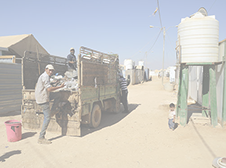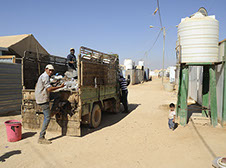VNG International Annual Update 2017
6 Empowering Local Governments in Conflict-Affected Regions
The number of refugees worldwide is the highest since World War II. By far the largest share of those seek security and shelter in neighbouring countries. Experience shows that this is often for long periods of time, up to twenty years and more. In addition, large numbers of Internally Displaced Persons (IDPs), seek to build a new life elsewhere in their own country. There is growing recognition that the influx of high numbers of refugees has a huge impact on the environment in which they arrive, from many points of view: the pressure on basic services such as waste disposal, water and sanitation, the economic dynamics, transport and mobility patterns, housing needs, and the long-term planning in all these areas. As a consequence, the response should not be limited to direct relief, but connect relief interventions with long term local development. This is reflected also in VNG International’s portfolio.
Financed by the Dutch ministry of Foreign Affairs, we are implementing the LOGOReP programme till the end of 2018 in Jordan and Lebanon. The programme is the extension of a project we started in 2014 in the Al Zaa’tari camp for Syrian refugees and in the surrounding Mafraq province, in Jordan. In this project, city planners of Amsterdam provided advice on the spatial planning and design of the camp to UNHCR (the UN organisation responsible for the management of the camp) taking the instrument of scenario planning as the main point of departure. In Lebanon, where there are also large numbers of refugees but no big camps, we have introduced together with the Dutch cities of Almere and The Hague, and with UNDP and UN Habitat, a low-cost/low-tech approach for a more sustainable waste cycle, which has already resulted in a much cleaner living environment for around 20,000 Lebanese inhabitants and 30,000 refugees. And also important: this approach can relatively easily be replicated elsewhere in Lebanon. For that purpose, experiences are shared through the local government Unions. In the West-Beqaa the programme, with local Union presidents in the lead, developed a regional economic development plan, linking current relief investments to long term development in the region. With the Unions we are currently working on concrete interventions in the field of urban development and waste water treatment.
In Eastern Ukraine too, municipal structures face challenges in providing basic public services to the high numbers of Internally Displaced People (IDPs), groups of citizens who are especially vulnerable and traumatised. At the same time, also the existing population, and often young people in particular, experience a lack of perspectives for the future. The trust in the government is weak, and resources and services are scarce and poorly administered. The project ‘Eastern Ukraine State Building and Accountability’ (EUSTAB, 2016-2017), funded by the Dutch Ministry of Foreign Affairs, was designed to address this complex situation. At the core of the project stands the building of trust and a stable, predictable, law-based relationship among citizens and municipalities. Both the demand-side (local civil society, including IDP groups) and the response side (local authorities) are supported in five municipalities. This has materialised so far in locally driven initiatives, developed with the involvement of local stakeholders, that aim to improve equal access to basic services, restore trust in local authorities, and to contribute to social cohesion among different ideological groups. These initiatives are now being implemented. Dissemination of the results of the project to other local governments within Ukraine is done through the local government associations. For more details of the initiatives:
In Libya, we implement the EU- and Dutch government financed project ‘Local Governance and Stabilization’ (December 2015 - December 2018). The project focuses on three dimensions of local governance: management, service delivery and participation. Pilot projects are being and will be implemented in 22 municipalities in the South, East and West of Libya. At the moment, municipalities are the only elected tier of government in Libya. The strong divisions which have such a negative impact on the country, can also be seen at local level. Working in this extremely complex environment is only possible with a high degree of pragmatism. Training activities sometimes have to take place in Tunisia for security reasons. Nevertheless, the first pilot projects in the area of urban planning have been approved and are now being implemented. Another concrete result is that one of the two border crossings with Tunisia reopened after a meeting of local authorities in our cross-border cooperation platform. It is rewarding to see the motivation of local government elected representatives, staff and civil society, who want to work together in order to create stability and the conditions for reconstruction.
Policy development and exchange of experience
We believe in further developing the new approach to protection of refugees in their area of origin, with a long-term perspective in mind, based on an integrated development vision for the region, and with a clear involvement of the surrounding population and local governments. Therefore, we work intensively together with UNHCR and UNDP, and with the national and provincial governments concerned. Together with the Dutch ministry of Foreign Affairs, we have organised a workshop during the World Humanitarian Summit in May 2016 in Istanbul. See the film that was projected there.
On behalf of United Cities and Local Governments, VNG International participates in the Global Alliance for Urban Crises, a network with members such as UN Habitat, the European Commission, academia, humanitarian NGOs and others. The global alliance is a good platform to share and collect lessons learned from projects, and create an urban perspective to crisis management. VNG International’s concrete examples about dealing with a refugee crisis or disaster preparedness are well appreciated.
We have also been invited to join the team for the next edition of the SPHERE handbook. SPHERE is a cooperation initiative of humanitarian agencies and NGOs such as UNHCR, the Red Cross and Oxfam. This document sets humanitarian standards and its next edition will include a chapter on urban refugees. VNG International brings to SPHERE its municipal perspective on shelter and settlement in the longer term. The Netherlands Ministry of Foreign Affairs requested VNG International to make sure that the next edition of the SPHERE handbook includes lessons learned in projects funded by it.
Furthermore, we supported Mr. Hans Janssen, Mayor of Oisterwijk, who was the rapporteur for an ‘own initiative’ Opinion of the EU Committee of the Regions: ‘Protection of refugees in their areas of origin: a new perspective.’ The Opinion was adopted in the Plenary Session of the Committee of the Regions on 8 April 2016. In 2017, we support him as rapporteur for the Opinion on ‘Migration on the Central Mediterranean route. Managing flows, saving lives.’




